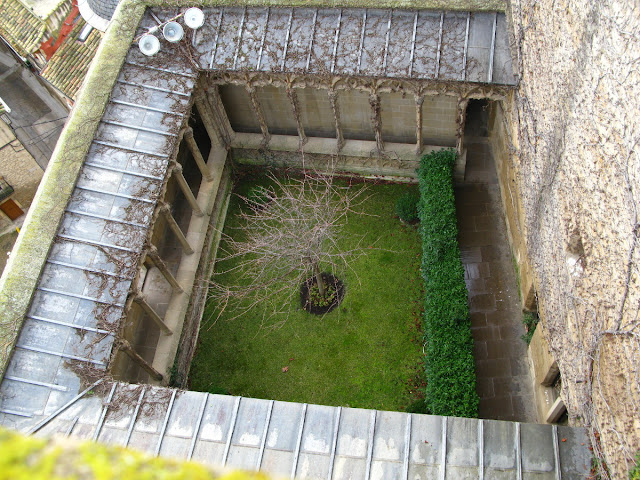Transition in Context
So why do transition at home, in your community?
"We are in the midst of a huge Transition whether we like it or not. Our world is changing radically and faster than ever before. Transition Towns are created by people who have recognised this and have the ability to engage with change and make it change for the better rather than change for the worse."- Naresh Giangrande
 |
| Palacio de los Reyes de Navarra de Olite, Spain, - White Mulberry Tree |
Every community will have specific challenges that are more important than others. What are the main issues that are facing your community?
Try not to impose your own opinions on what the community needs. Listen carefully. When I was doing market research for my business, I found out that most people don't think the same way as I do. This was a great opportunity to pivot my business offerings and find connections to areas I had not previously considered.
For example, you might think that the main problem in your community is the lack of a composting program but when you ask people, you might find it's lack of parking in the down town core, unsafe road crossings or the price of beer.
The great thing about Transition is that it is by design, flexible and adaptable to solving problems within the local context.
 |
| Jack and Daniel and the Royal Palace of Olite, Spain |
There have been many community consultations in Creston during the last four years to find out what the community wants and needs. Much of this work has been developed through Kootenay Employment Services (KES). Not surprisingly for anyone who has visited Creston, one of the areas of focus in Creston is agriculture. Through some brilliant work by Laura Francis, a initiative called Fields Forward started in 2016, and has been spearheaded by Paris Marshall Smith and a lovely impact team for the past year.
"Fields Forward Envisions a vibrant productive local agri-food system that builds genuine community wealth by supporting and sustaining the community's environmental, indigenous, social, cultural, economic and aesthetic values."
 |
| Hendaye, France |
This weekend marked the first year anniversary of Fields Forward and it was lovely to hear about all the projects that have started during the last year. One projects that I think is a huge boon to our valley is the purchase of a Mobile Fruit and Vegetable Press. The press can process and package 900 litres of apple, pear, carrot, beet, cherry or berry juice per hour or up to 20,000 lb of fruit daily. This will create opportunities for farmers to produce value added products with a fraction of the equipment cost, as well redirect 252,000 lb of agricultural waste from the landfill.
Another project in the future of Fields Forward is to help create a distribution network to institutions in the Columbia Basin that account for large purchases of food supplies. Creston has one of the best growing climates in the BC Columbia Basin, and has great potential to supply local produce, meat, grain and dairy to the region with better access to distribution and marketing.
 |
| Hendaye, France |
Another initiative that started this year with work from Eden Yesh at KES, was the Creston and District Community Investment Co-op (CDCI Co-op). One issue in creating resilient, local economies is access to capital for businesses to start and grow. Our current financial systems creates a situation where investments tend to go towards far off stock-exchanges and corporations, instead of creating local jobs and wealth in the place where we live.
The CDCI Co-op is a "community investment tool that aims to direct new, or pre-existing, investment capital from local residents into local ventures with high community impact."
None of this projects are branded as Transition Initiatives, yet some of the methodology and outcomes are similar. They are asking questions, visioning and addressing key challenges and priorities in the community. These are groups of thoughtful, inspired community members coming together to make the place they live more beautiful, more productive, more engaging.
So what does your community need? What does it want to become? Where are the barriers to building healthy, resilient communities?
 |
| Southern France/Northern Spain |



Comments
Post a Comment